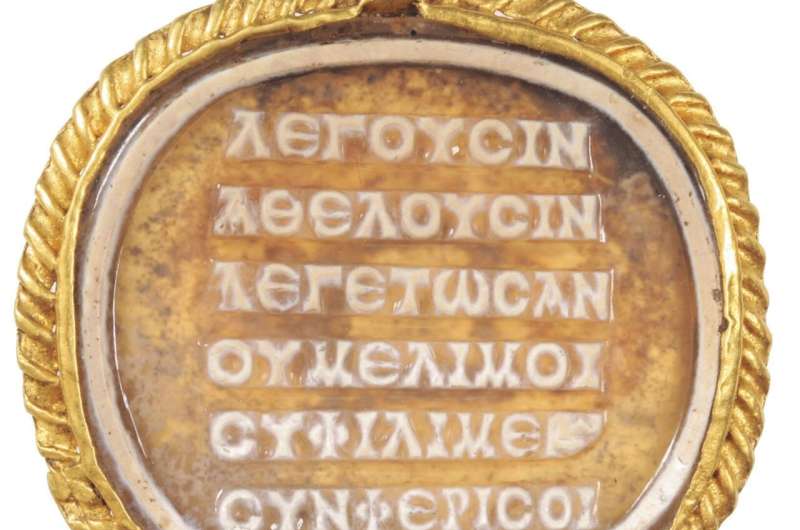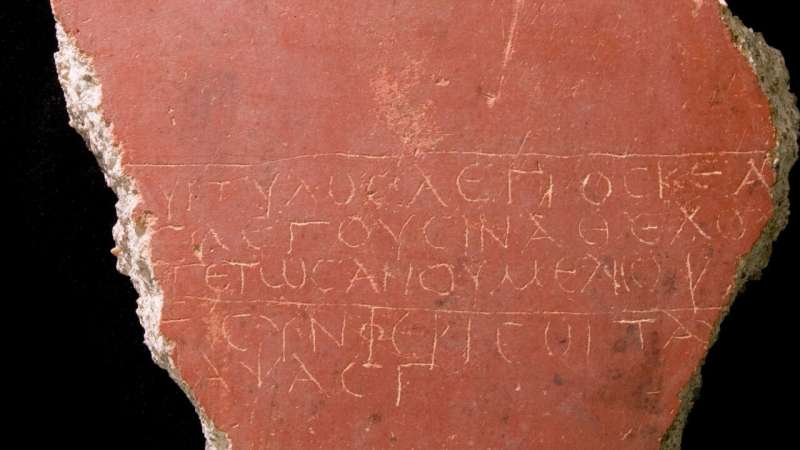
New research into a little-known text written in ancient Greek shows that "stressed poetry," the ancestor of all modern poetry and song, was already in use in the 2nd Century CE, 300 years earlier than previously thought.
In its shortest version, the anonymous four-line poem reads "they say what they like; let them say it; I don't care." Other versions extend with "Go on, love me; it does you good."
The experimental verse became popular across the eastern Roman Empire and survives because, as well as presumably being shared orally, it has been found inscribed on twenty gemstones and as a graffito in Cartagena, Spain.
By comparing all of the known examples for the first time, Cambridge's Professor Tim Whitmarsh (Faculty of Classics) noticed that the poem used a different form of meter to that usually found in ancient Greek poetry. As well as showing signs of the long and short syllables characteristic of traditional "quantitative" verse, this text employed stressed and unstressed syllables.
Until now, "stressed poetry" of this kind has been unknown before the fifth century, when it began to be used in Byzantine Christian hymns.
Professor Whitmarsh says: "You didn't need specialist poets to create this kind of musicalized language, and the diction is very simple, so this was a clearly a democratizing form of literature. We're getting an exciting glimpse of a form of oral pop culture that lay under the surface of classical culture."
The new study, published in The Cambridge Classical Journal, also suggests that this poem could represent a "missing link" between the lost world of ancient Mediterranean oral poetry and song, and the more modern forms that we know today.
The poem, unparalleled so far in the classical world, consists of lines of 4 syllables, with a strong accent on the first and a weaker on the third. This allows it to slot into the rhythms of numerous pop and rock songs, such as Chuck Berry's "Johnny B. Goode."
Whitmarsh says: "We've known for a long time that there was popular poetry in ancient Greek, but a lot of what survives takes a similar form to traditional high poetics. This poem, on the other hand, points to a distinct and thriving culture, primarily oral, which fortunately for us in this case also found its way onto a number of gemstones."
Asked why the discovery hasn't been made before, Whitmarsh says: "These artifacts have been studied in isolation. Gemstones are studied by one set of scholars, the inscriptions on them by another. They haven't been seriously studied before as literature. People looking at these pieces are not usually looking for changes in metrical patterns."
Whitmarsh hopes that scholars of the medieval period will be pleased: "It confirms what some medievalists had suspected, that the dominant form of Byzantine verse developed organically out of changes that came about in classical antiquity."
In its written form (which shows some minor variation), the poem reads:
Λέγουσιν: They say
ἃ θέλουσιν: What they like
λεγέτωσαν: Let them say it
οὐ μέλι μοι: I don't care
σὺ φίλι με: Go on, love me
συνφέρι σοι: It does you good
The gemstones on which the poem was inscribed were generally agate, onyx or sardonyx, all varieties of chalcedony, an abundant and relatively inexpensive mineral across the Mediterranean region.


Ancient Greek 'pop culture' discovery rewrites history of poetry and song
New research into a little-known text written in ancient Greek shows that "stressed poetry," the ancestor of all modern poetry and song, was already in use in the 2nd Century CE, 300 years earlier than previously thought.
